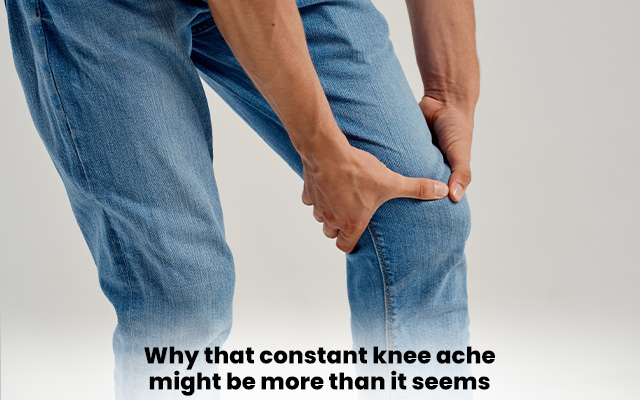Living with knee pain can be frustrating, especially when it doesn’t seem to get better despite trying various remedies. Many of us tend to ignore the pain, thinking it will go away on its own, but over time, it might actually worsen.
So, let’s take a closer look at what that constant knee pain might really mean and why it could be more serious than it seems.
What Does It Mean If My Knee Is Constantly Hurting?
Constant knee pain typically signals that something is wrong, and it shouldn’t be ignored. There are several potential causes of knee pain, including:
- Osteoarthritis – A common cause of knee pain in adults, where the cartilage in the knee wears down, causing friction and discomfort.
- Injury or Overuse – Repeated stress or trauma to the knee can cause strain on ligaments, tendons, or cartilage, leading to chronic pain.
- Bursitis – Inflammation in the fluid-filled sacs around the knee can result in constant discomfort.
- Patellar Tendonitis – Overuse of the knee can lead to inflammation of the tendons, resulting in pain, especially after physical activity.
What Deficiency Causes Knee Pain?
Certain nutrient deficiencies can contribute to knee pain, particularly those that affect the health of your bones, joints, and tissues. Some common deficiencies include:
- Vitamin D Deficiency – Low levels of vitamin D can lead to weakened bones and joints, causing pain and stiffness, especially in the knees.
- Calcium Deficiency – Calcium plays a vital role in bone health. A lack of calcium can make the bones brittle, increasing the risk of joint pain and fractures.
- Magnesium Deficiency – Magnesium helps with muscle and nerve function. Deficiency can cause muscle cramps and joint pain, including in the knees.
- Omega-3 Fatty Acids – Omega-3s help reduce inflammation in the body. A lack of these essential fats can lead to increased pain and stiffness in the knees.
Ensuring you are getting the right nutrients can help manage knee pain and improve overall joint health.
How Do I Get My Knee Pain to Stop?
The best approach to stop knee pain depends on its underlying cause. Here are some steps that can help:
1. See a Specialist
If your knee pain persists, it’s important to see an orthopedic specialist at Kasturi Medical Centre. They can diagnose the issue accurately and recommend the right treatment.
2. Physical Therapy
Working with a physical therapist can help strengthen the muscles around the knee and improve flexibility, which can relieve pain.
3. Lifestyle Modifications
Maintaining a healthy weight can reduce pressure on the knee joints. Additionally, wearing proper footwear and avoiding high-impact activities can prevent further strain on the knees.
4. Surgical Intervention
In more severe cases, surgery may be necessary, such as arthroscopic surgery to repair damaged cartilage or a knee replacement in the case of advanced osteoarthritis.
Conclusion
Knee pain is not something that should be ignored, especially if it’s persistent. It’s essential to understand the cause of the pain and take action before it develops into a more serious issue.
If you are struggling with knee pain that doesn’t seem to go away, it’s time to consult a healthcare professional.
If you are looking for expert treatment for knee pain, consider visiting Kasturi Medical Centre, a superspeciality hospital in South Kolkata.
Our experienced orthopedic specialists will help diagnose and treat the root cause of your knee pain.

